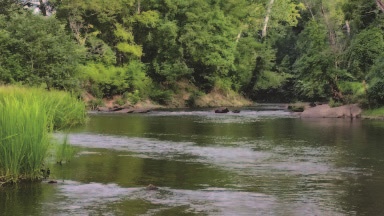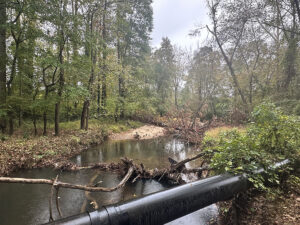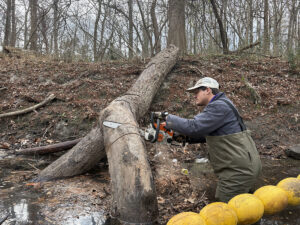News
Sound Rivers and partners reach groundbreaking settlement with NCDOT
Environmental, Press Release, Sound Rivers
Posted on August 22nd, 2019
This week Sound Rivers reached a momentous settlement with the North Carolina Department of Transportation over their proposed 540 expansion in Wake County. As a result of this settlement, changes to the project will be made, greatly reducing its impact on your environment, including your waterways. This balanced agreement provides for expanded mobility options in the region, while preserving natural areas and moving North Carolina forward in efforts to balance construction and preservation.
Your Upper Neuse Riverkeeper, Matthew Starr, worked diligently with partners (Southern Environmental Law Center, Clean Air Carolina, and the Center for Biological Diversity) to ensure this settlement sets an important precedent for all future projects across the state. It includes new requirements to reduce polluted stormwater runoff, often a result of construction, and preserves open space, including along your waterways.
“The settlement agreement puts in place key protections for the Neuse River watershed – doubling the amount of stream mitigation that will be provided and setting in motion data-collection efforts that will further enhance clean water protections in Wake County” said Upper Neuse Riverkeeper Matthew Starr. “The North Carolina Department of Transportation now has a blueprint of how to better protect other water resources throughout the state, which they can use moving forward for other projects.”
From SELC: “Land preservation and stream mitigation efforts will significantly assist the preservation of some of North Carolina’s most precious wildlife. In addition, the settlement commits NCDOT to partner with other agencies and North Carolina State University to support numerous research projects for some sites that are home to North Carolina’s most imperiled aquatic biodiversity, including wildlife currently on the brink of extinction.”
The settlement will double the amount of stream restoration required to offset the impact of construction, which is a huge win for your waterways. Lastly, but certainly not least, this massive settlement contains important provisions to address climate change and air quality.
This historic settlement – protecting your waterways now, and in the future – would not have been possible without the dedication from Sound Rivers staff, and your support of their work.
Read more specifics about the settlement in SELC’s press release here.
Related News

Data center subject of Riverkeeper, county manager meeting
January 15th 2026

New tool determines best projects to minimize flood risk
January 15th 2026

Sound Rivers set for newest trash trap install
January 15th 2026

2nd trash trap gets chainsaw treatment
January 15th 2026

Great Blue Heron award recipients
January 15th 2026

Sound Rivers petition delivered to EPA
January 8th 2026

‘No answers’ at second Kingsboro data center meeting
January 8th 2026

Chainsaw-wielding staff take on Little Rock Creek trash trap
January 8th 2026

